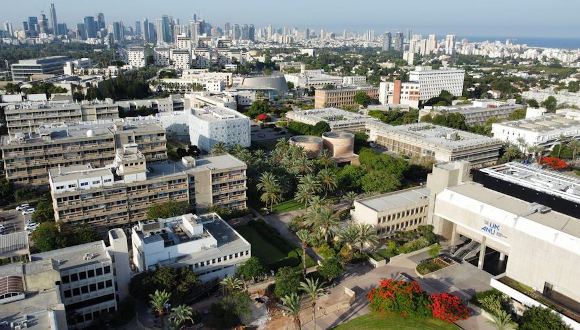TAU to switch entirely to sustainable electricity within two years

University’s Green Campus Committee will use new report to formulate practical plans to reduce emissions
Support Tel Aviv UniversityIn a first among Israeli academic institutions, the Green Campus Committee at Tel Aviv University (TAU) has released an external, comprehensive, and objective report that inspected and assessed all campus greenhouse gas emissions (both direct and indirect) as part of initial steps in a ten-year plan for reaching carbon neutrality.
The report was prepared by the company “EcoTraders” according to the GHG Protocol, the global standardized framework used to measure greenhouse gas emissions.
The comprehensive report includes details on all campus facilities that are owned and operated by the University, including the Broshim and Einstein student dormitories. The carbon footprint of the University’s suppliers was also assessed, from electricity consumption on campus, to transportation and construction inputs, to the food served at conferences and cafeterias. The report was conducted using the University’s 2019 emissions data as a baseline year reference (before the outbreak of the COVID-19 pandemic, which disrupted many activities, resulting in a temporary reduction in emissions).
“We are working to make sure that in two years all of the electricity produced on campus will be green,” said Gady Frank, TAU’s Director-General. “Currently, we have more than 5000 meters of photovoltaic cells, and our goal is to triple their amount on campus rooftops. In addition, we will install storage facilities, which will drastically increase the yield of these solar cells. The rest of the energy would be bought from private suppliers specializing in producing energy solely from green sources.”
“Tel Aviv University has decided to do its modest part to reduce greenhouse gas emissions, which is crucial for addressing the climate crisis,” Professor Ariel Porat, President of TAU and Chairman of its Green Campus Committee, continued. “We intend to formulate a methodical and detailed 10-year plan, with the goal of attaining carbon neutrality further down the road. Our hope is to inspire other institutions in Israel and around the world to take similar actions, which, in addition, help educate the next generations about this important subject.”
About a year ago, the University’s Green Campus Committee, led by Professor Porat and Frank, appointed a team of academic and administrative experts to create a strategic plan with the goal of significantly reducing greenhouse gas emissions on campus by encouraging more efficient use of resources and investing in renewable energy.
The team of experts hired EcoTraders to perform a baseline assessment of the overall carbon footprint (in terms of CO2 equivalent) of all TAU activities, both on and off campus. The team includes Professor Marcelo Sternberg of TAU’s George S. Wise Faculty of Life Sciences and Head of the Expert Team; Dr. Vered Blass and Dr. Orli Ronen of TAU’s Porter School of the Environment and Earth Sciences; Professor Avi Kribus of TAU’s Fleischman Faculty of Engineering; Ofer Lugassi, TAU’s Deputy Director-General for Construction and Maintenance; and Alon Sapan, Director of The Steinhardt Museum of Natural History at TAU.
Now, with the publication of the report’s findings, the expert team is developing a practical plan to reduce the campus’s greenhouse gas emissions, which will be presented for comments and discussion within the Green Campus Committee and then submitted for approval by the University administration. TAU places great importance on taking action to reduce its carbon footprint, including using sustainable energy, recycling water and materials, limiting the use of paper, reducing emissions caused by transportation and flights, and introducing green purchasing procedures, with the goal of eventually attaining carbon neutrality.
“We set out on this mission about a year and a half ago, and decided that in order to lead real change on campus, we must conduct a thorough and comprehensive mapping of all of the University’s greenhouse gas emissions,” the team noted. “This is a complex process that required the enlistment of many parties on campus, who agreed for the first time to share with us, and the authors of the report, information that had not been made public until now. This is the first time that an Israeli university has taken this kind of action, and we are confident that other universities will follow in our footsteps.”